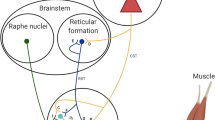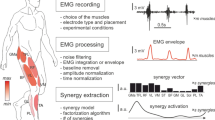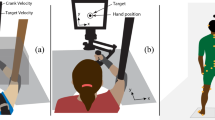Abstract.
The coordination of homolateral effectors (right arm/right leg) according to the in-phase or anti-phase mode was perturbed through passive movement of a third segment (left arm or left leg) imposed by the experimenter. The manipulated parameters of the passive segment were frequency and amplitude along with their degree of scaling. Results showed that passive movement degraded anti-phase patterns more than in-phase patterns. Furthermore, the anti-phase mode deteriorated profoundly during frequency manipulation, but scaling did not induce additional effects, whereas a linear association was observed between anti-phase deterioration and amplitude manipulation. Together, these data indicate that passive movement disturbed the coordination dynamics of an actively performed task. The fact that interference depended on the manipulated parameter suggests a distinction in the degree of intrusiveness of the irrelevant afferent information induced by the passive limb. It is concluded that sensory discrimination between irrelevant and relevant input is critical in performing a coordinated task adequately under perturbed conditions.
Similar content being viewed by others
Author information
Authors and Affiliations
Additional information
Electronic Publication
Rights and permissions
About this article
Cite this article
Serrien, D.J., Li, Y., Steyvers, M. et al. Proprioceptive regulation of interlimb behavior: interference between passive movement and active coordination dynamics. Exp Brain Res 140, 411–419 (2001). https://doi.org/10.1007/s002210100820
Received:
Accepted:
Issue Date:
DOI: https://doi.org/10.1007/s002210100820




